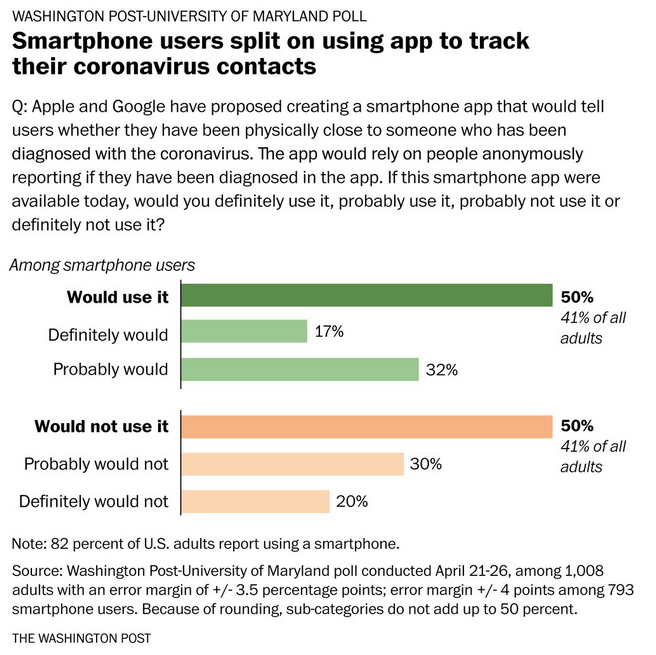- April 30, 2020
- By Sara Gavin
As tech giants Google and Apple work feverishly to develop smartphone apps to track the spread of COVID-19 and alert users who come in contact with an infected person, a new University of Maryland-Washington Post poll finds most Americans would be unable or unwilling to use the technology.
The poll, which surveyed a random national sample of 1,008 adults April 21-26, found nearly one in six Americans don’t even use a smartphone, with usage much lower than average among seniors, who have a higher risk of developing life-threating complications from the coronavirus. Just 53% of respondents 65 or older say they have a smartphone, the poll finds.

“The lack of trust many have for tech companies to keep their data anonymous will likely influence the rate at which these apps are adopted,” said Michael Hanmer, a professor of government and politics, who co-directed the poll. “In the short term, building that trust will be challenging.”
This is the second wave of a series of polls conducted by UMD’s Center for Democracy and Civic Engagement and The Washington Post to track Americans’ experiences during the COVID-19 pandemic. Findings from this latest survey also reveal a strong majority of Americans support current restrictions on businesses and public gatherings despite movements in some states to relax stay-at-home orders and reopen parts of the economy. Nearly two in three Americans say the restrictions on restaurants, stores and other businesses in their states are appropriate;16% say they are not tight enough.
The UMD-Post poll also finds 65% of Americans support a temporary halt on all immigration during the pandemic. Republicans overwhelmingly back the idea, with 83% in favor. Democrats are split on the issue, with 49% supporting and 49% opposing. Among independents, 67% say they support such a move.
“One of the most surprising results is that majorities of 18- to 29-year olds, who tend to be more open to immigration and have a more global perspective, support the proposal to block immigration,” said Hanmer. “I suspect part of the explanation lies in a general desire for action and part in the way the policy has been framed. With unemployment reaching unprecedented levels and job prospects severely limited, the economic frame was one that likely resonated with large portions of the public, including young people.”
Most Americans remain worried about becoming infected with the virus; six in 10 polled say they are either very or somewhat worried about becoming infected and seriously ill, essentially unchanged from the 57% in a UMD-Post poll taken roughly a week earlier.
Read more about the poll’s most recent findings in this Washington Post article, co-authored by UMD government and politics Ph.D. student Alauna Safarpour, who is serving as a fellow in news polling at The Post.
Topics
Research